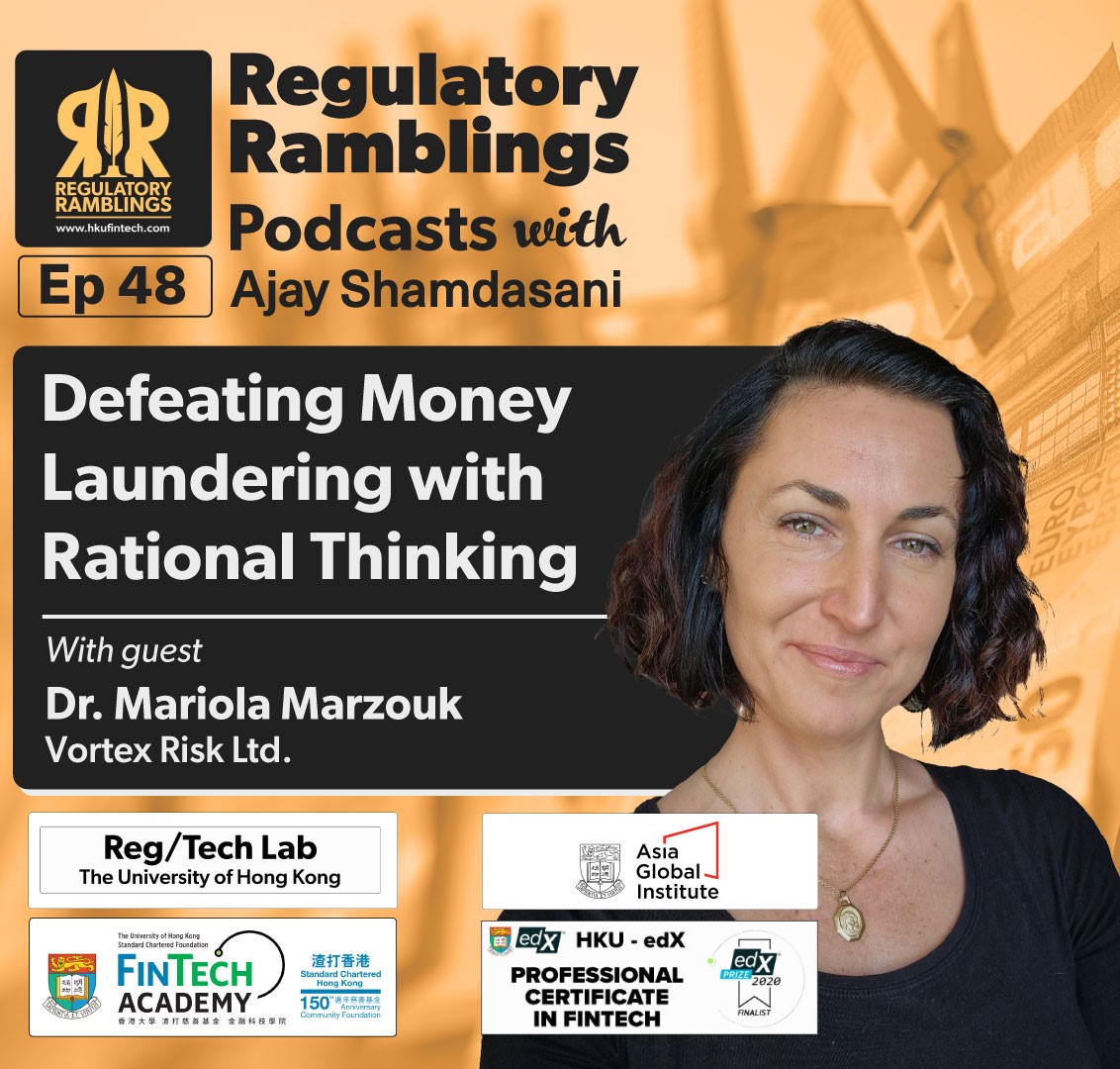Dr. Mariola Marzoukis isan anti-money laundering (AML) professional with extensive experience in regulatory software and consulting across the public and private sectors. Her career has involved working with global banks on how to use technologies to address regulatory compliance demands.
In 2023, after completing her doctorate in criminal justice focused on trade-based money laundering (TBML) and technology, she co-founded Vortex Risk Ltd. with her colleague Dr Nicholas Gilmour (himself a guest on episode #18 of Regulatory Ramblings). The firm provides insights into money laundering practices to individuals and organizations worldwide. Vortex Risk’s approach empowers clients by offering perspectives akin to rational-thinking criminals operating discreetly to evade regulatory suspicion.
Over the course of her career, Mariola has held strategic product management positions at internationally recognized companies such as British Aerospace and Engineering (BAE) Applied Intelligence, EY, NICE Actimize, and Napier AI.
She specializes in financial crime prevention and has demonstrated expertise in detecting money laundering schemes using advanced technologies. Over time, her focus extended to the ever-growing specter of TBML, and her research in this area has garnered recognition within the industry. Mariola’s pilot study on Brexit’s impact on TBML has been published in the Journal of Money Laundering Control, featured on GTR News, and cited by the Institute of Export and International Trade UK.
In this episode of Regulatory Ramblings, she chats with host Ajay Shamdasani, describing her path from Poland to the UK, first as a student and now as a much sought-after financial crime professional in London.
The conversation underscores Mariola’s philosophy: defeating money laundering requires rational thinking and not merely compliance red flags. She eschews the notion of compliance as an exercise in perfunctory box-ticking and form-filing – a perennial lament in the profession.
She shares that her approach towards AML more generally is to precisely deploy RegTech to aid regulated entities in detecting criminality. While acknowledging that data analytics and artificial intelligence (AI) are essential tools in the battle against financial crime, she stresses that technology is not a panacea and works best when used in tandem with the skills, temperament, wisdom, and judgment that experienced professional researchers and investigators have developed over time. AI is no substitute for analysis by a human and good old common sense.
Mariola admits that while she does not have a background in science, technology, engineering, or math (STEM), her experience as a product manager and corporate strategist has afforded her insight into what customers need from technical solutions and a sense of discernment about when to apply which technologies, if at all. While not a techie per se, she has developed an understanding of technological development and how and when it should be deployed to solve specific problems. Ultimately, tools should meet the objectives of problem-solving, she says.
She recounts the various learning curves she experienced from the business side while coping with the more technical aspects of roles throughout her career.
The discussion concludes with Mariola stating her views on the prevailing hypocrisy in AML and sanctions enforcement. The financial world is all too often regulated from Washington, New York, London, and Brussels. Yet, while the US and UK are some of the most aggressive jurisdictions regarding financial crime enforcement actions, their regulatory apparatus is often used to further their geopolitical goals. It is a view outside of the West that Mariola says is not without merit.
Podcast Discussion
3:09 Mariola Marzouk’s Journey into Financial Crime
9:58 Combating Trade-Based Money Laundering: A Personal Pursuit of Restorative Justice
15:25 Disrupting the Norm: Money Laundering and Regulatory Realities
26:43 Unveiling Trade-Based Money Laundering: Beyond Trade Finance Myths
35:03 Technology in Regulatory Compliance: Unfulfilled Promises and Hidden Realities
41:08 The Disconnect and Challenges in Developing Effective RegTech Solutions
50:20 Challenges of Automation and Critical Thinking in Financial Crime Compliance
1:02:52 Assessing the Effectiveness of Sanctions Amidst Strategic Adaptations
1:06:34 Bridging Divides through Education
1:12:57 Gender Dynamics and the Future of Anti-Money Laundering
Connect with RR Podcast at:
LinkedIn: https://hk.linkedin.com/company/hkufintech
Facebook: https://www.facebook.com/hkufintech.fb/
Instagram: https://www.instagram.com/hkufintech/
Twitter: https://twitter.com/HKUFinTech
Threads: https://www.threads.net/@hkufintech
Website: https://www.hkufintech.com/regulatoryramblings
Connect with the Compliance Podcast Network at:
LinkedIn: https://www.linkedin.com/company/compliance-podcast-network/
Facebook: https://www.facebook.com/compliancepodcastnetwork/
YouTube: https://www.youtube.com/@CompliancePodcastNetwork
Twitter: https://twitter.com/tfoxlaw
Instagram: https://www.instagram.com/voiceofcompliance/
Website: https://compliancepodcastnetwork.net/




